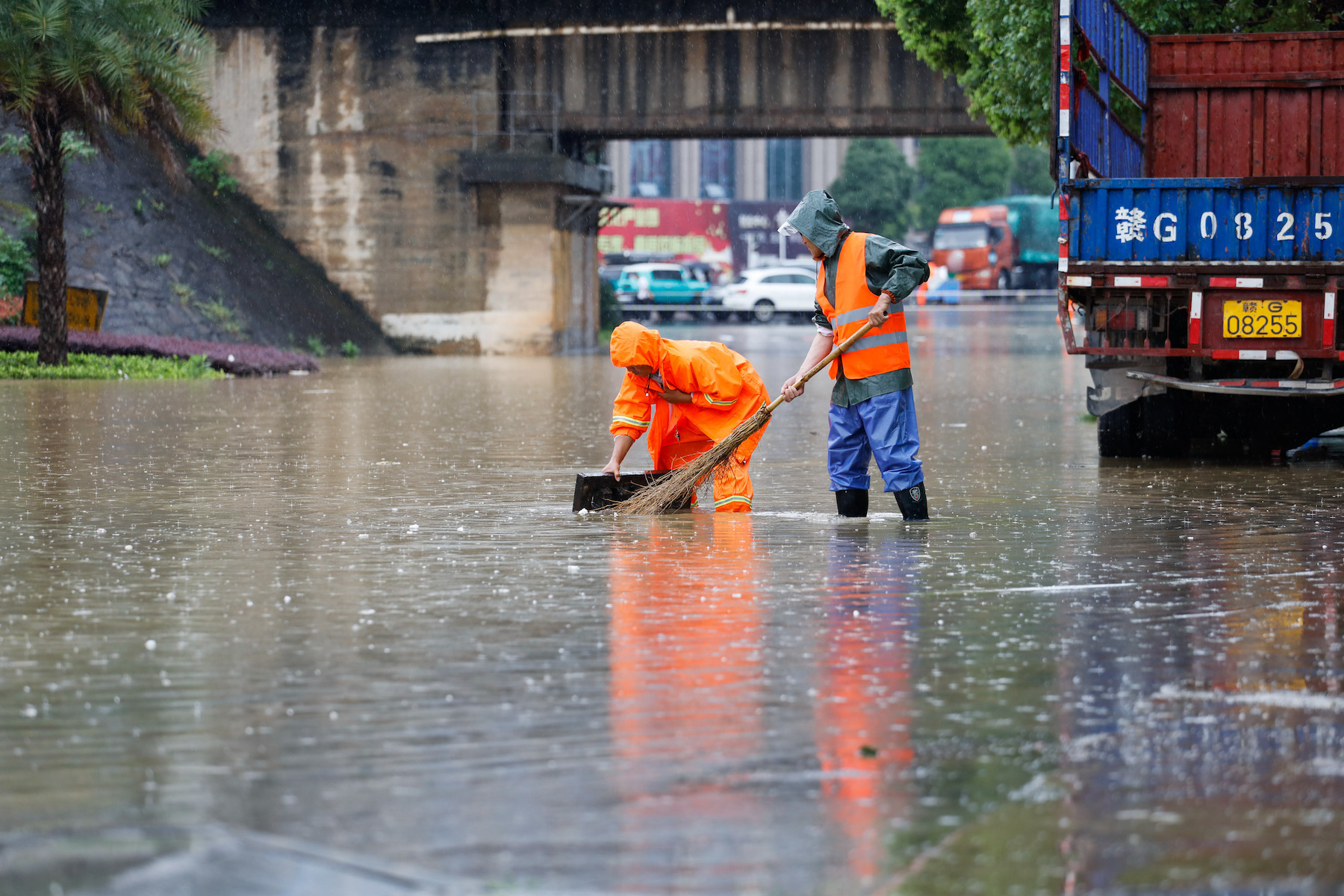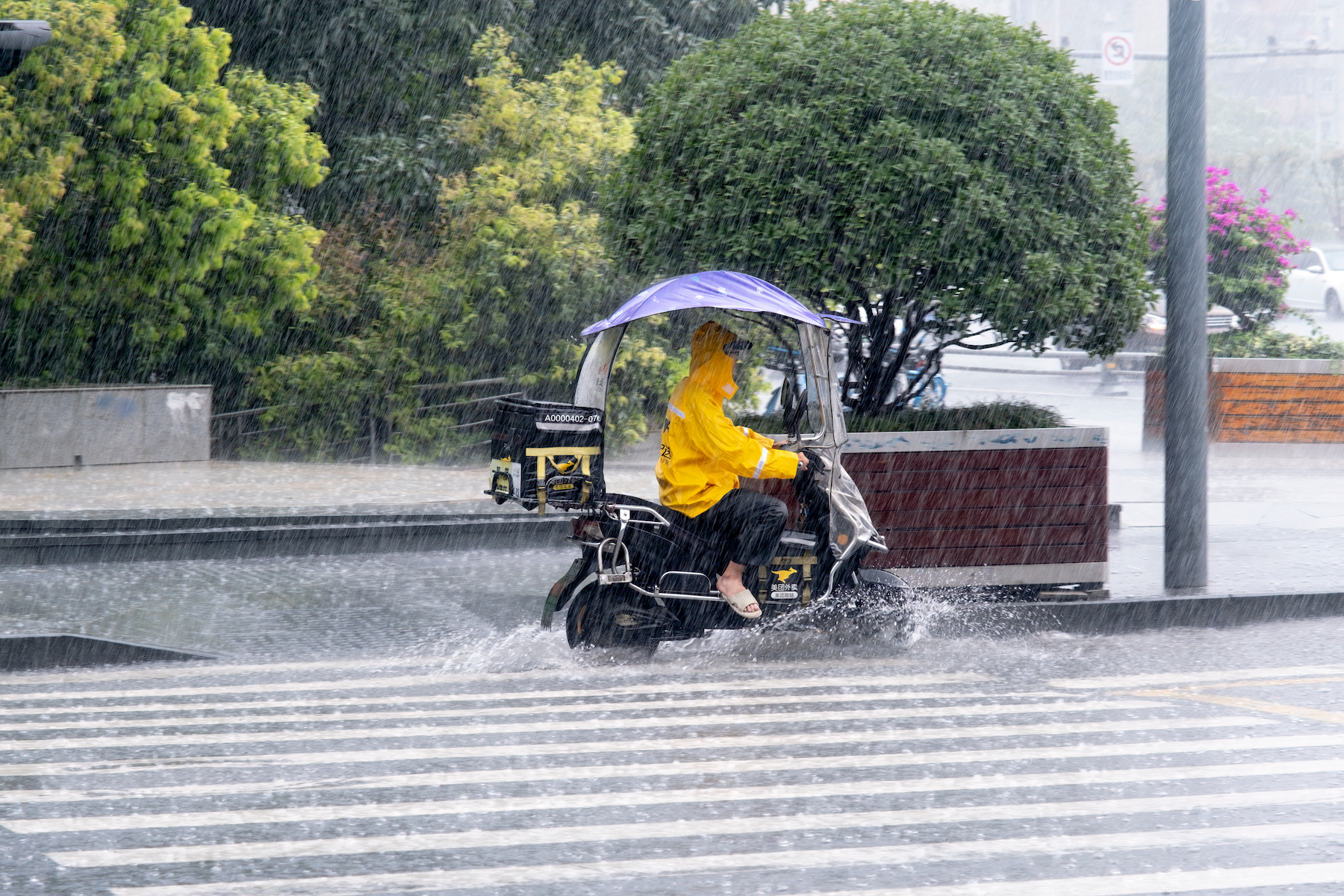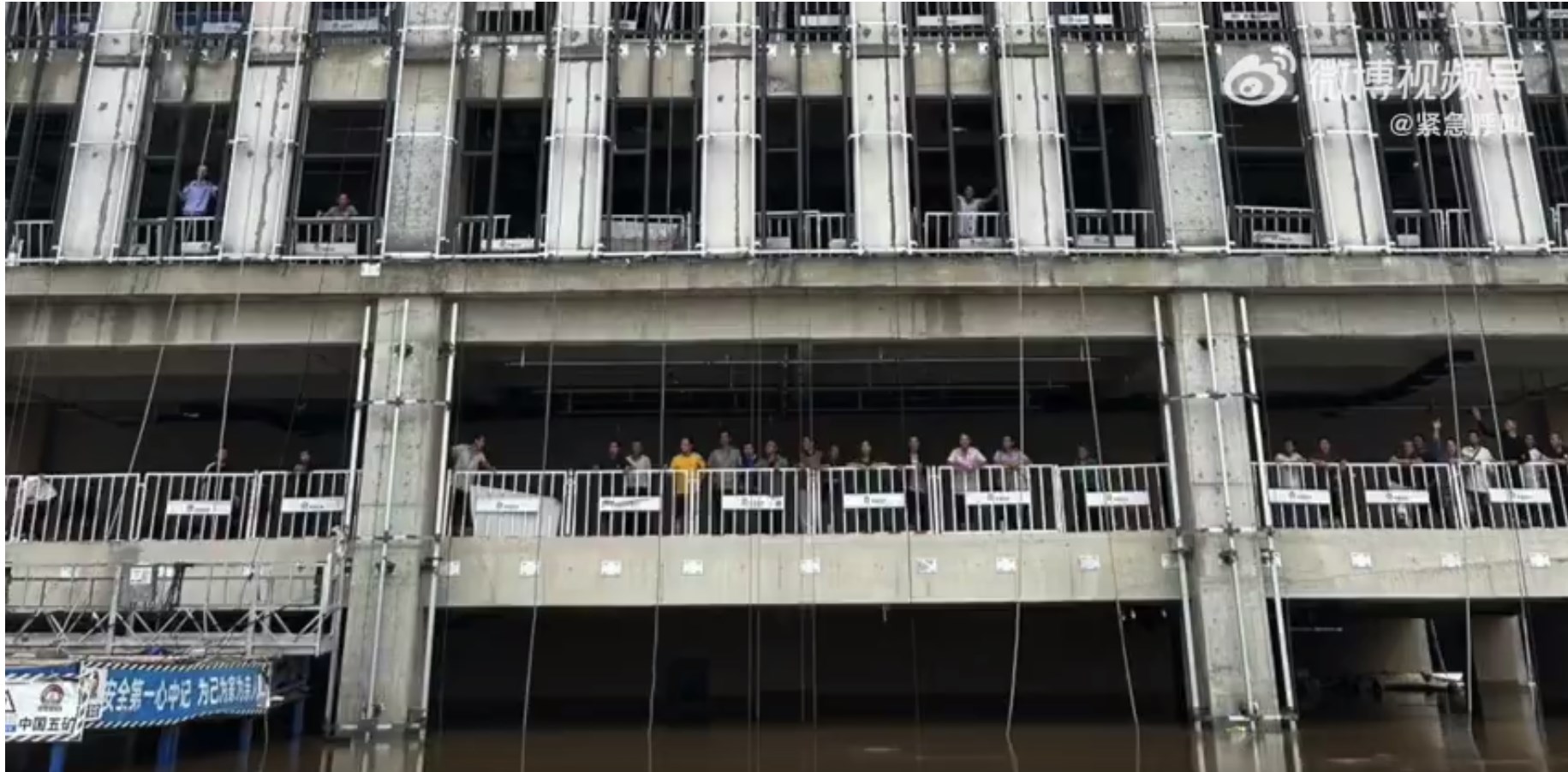When Typhoon Doksuri hit China in late July, the sudden and heavy rainfall led to flooding in the northeast. By early August, around 1.3 million people in the capital city of Beijing were affected by the flood, which collapsed tens of thousands of structures and took the lives of at least 33 people. In nearby Hebei province, over a million residents were relocated. Floodwaters still have not completely receded, and the rescue and clean-up efforts are ongoing.
China Labour Bulletin’s Workplace Accident Map and domestic media reports show how workers’ safety has been put at risk from this extreme weather incident. Frontline workers, like rescue teams and sanitation workers, faced risks directly from responding. Other workers, like transport and construction workers, were left vulnerable on the job.
Rescue workers risk their lives to save those trapped by flooding
According to official figures, at least five people died in Beijing while participating in rescue efforts. CLB’s Accident Map recorded some notable cases in the region. On 31 July, a civil servant died while doing rescue work in a village in Beijing. A wall suddenly collapsed and buried the worker.
On 2 August, a firefighter drowned in Beijing after rescuing a person and his colleague. On 6 August, three civil servants - including the vice mayor of Shulan in Jilin province - drowned during evacuation and rescue work in Jilin city.

Photograph: humphery / Shutterstock.com
Sanitation workers need rescue, drown while clearing flood debris
Sanitation workers are among the outdoor workers at high risk from floods, and their job often includes tasks like clearing drains of flood debris. For example, a sanitation worker fainted when dredging in the rain in Beijing on 1 August.
On 19 July, Nanjing experienced its second-heaviest rainfall in ten years. That day, four sanitation workers and two residents sheltered under a culvert, where they were swept into the waters.
One worker, Jiang Meihua, drowned. According to The Paper, the sanitation company only offered to pay 200,000 yuan as compensation to the family. Jiang’s son contested this, pointing to signs that the company should take more responsibility. He said that the company did not warn Jiang of the heavy rainfall, and no warning signs near the culvert indicated danger.
Jiang’s son questioned the lack of timely rescue measures. The survivors were saved only through self-rescue and the help of nearby residents. He said:
I hope that my mother’s incident will be a lesson, and relevant departments can learn from experience to further improve timely rescue measures and emergency plans.
Truck drivers and delivery workers injured on the roads
During adverse weather conditions, while most residents are sheltering at home, transport workers are still on the roads, which are more dangerous than usual. Floods caused some bridges to collapse, affecting vehicles travelling across. On 30 July, a bridge in Baoding, Hebei province collapsed, and two trucks fell off the bridge. One driver was rescued and another is still missing.
Truck drivers may also get caught in flood waters when the levels are too deep to continue driving. On 31 July, a highway in Beijing was heavily flooded. A truck driver and his colleagues had to abandon their truck and seek safety on higher ground.
According to The Paper, another driver refused to leave his truck even when most of the cab was underwater. Rescuers spent a long time persuading him to leave.
One explanation for this is that truck drivers might have difficulties in claiming compensation from insurance companies for damage. A truck driver in Zhuozhou, Hebei province, said that the insurance company required a driver's licence to make a claim, but the licence, which she kept in her truck, was lost during the flood.
Delivery workers face high work pressure during adverse weather. According to a worker interviewed by Jiemian News, the attendance system has been more strict than usual for delivery platforms:
Normally delivery workers get one rest day per week, but when the weather forecast says there will be bad weather, no one can rest, not even if you’re sick. I know that a delivery worker had a fever but still got dragged by the system to go to work. He could not stand it and took leave, and that got him fired.
Typically, delivery workers will receive bonuses for working during storms, when demand for delivery is higher. But this year, workers received fewer incentives. According to The Economic Observer, the inclement weather bonus fluctuated and was not the same for every rider, ranging from 0.3 to 3 yuan per order. One worker said that the bonus was lower than two years ago, when it ranged from 3 to 5 yuan per order.

Photograph: B.Zhou / Shutterstock.com
Heavy rains also make deliveries more difficult, and riders are more prone to traffic accidents. And even though some platforms loosened the delivery time requirement, workers still got penalised for late deliveries. Riders also face rain damage to their personal property that is essential to their work, like mobile phones and vehicles. They may have difficulty getting compensated for these economic losses.
Workers become trapped in warehouses and on construction sites
The severity of flooding in north-eastern China took ordinary citizens by surprise. Those working as usual could not return home, becoming trapped in warehouses and construction sites.
Zhuozhou, Hebei province, was one of the most severely affected regions. According to Caixin, in addition to extremely high local rainfall, the city had to breach river dikes to allow water from Beijing to flow to Zhuozhou’s flood-storage areas.
Zhuozhou has a large concentration of warehouses, after the capital city’s publishing industry made the nearby move in the last several years. Many books were destroyed in the recent floods. On 1 August, about 70 publishing workers for BooksChina.com were trapped without water, food, or electricity. Some of them became ill and vomited from a pungent smell coming from a factory nearby that was also affected by flooding. The workers were eventually rescued.
In another incident in Zhuozhou on 2 August, about 50 construction workers were trapped at their worksite.

Construction workers in Zhuozhou trapped on their worksite on 2 August 2023. Source: CLB Accident Map.
Workers need better mechanisms to raise safety concerns from the frontlines
Extreme weather situations are on the rise due to climate change, and they affect almost everyone in a given region. Vulnerable workers are often at greater risk of injury and death in these situations because their livelihoods depend on their labour, which is sometimes even linked to the weather conditions, as in the case of rescue workers, sanitation workers, and transport workers. In these situations, employers have a responsibility to follow laws and regulations, warn workers of potential risks, and ensure worker safety comes before profit and productivity.
Likewise, governments have a responsibility to provide adequate weather warnings, ensure laws and regulations are enforced, and ensure the safety of citizens including workers. Stronger protections for workers, such as mandatory work stoppages related to weather conditions, would go a long way to protect workers.
There is precedent for local accountability related to disaster response. In July 2021, for example, severe flooding in Zhengzhou, Henan province, took almost 400 lives, and in January of the following year, 89 Henan officials were held accountable for failing to take adequate responsibility for prevention measures and disaster relief.
China’s official trade union, specifically, has a role to play in work safety. Under China’s Work Safety Law, the union is responsible for monitoring safety at the workplace level, and workers who raise serious safety issues on the job cannot be retaliated against for doing so or for walking off the job. The trade union could also advocate for policy change related to work safety and adverse weather conditions, and support workers making claims against non-compliant employers.
Further CLB reading:
- An Introduction to CLB’s Work Accident Map (updated June 2022)
- Will China’s trade union finally live up to its obligations under the Work Safety Law? (August 2021)
- What You Need to Know About Workers in China: Work safety (updated September 2021)
